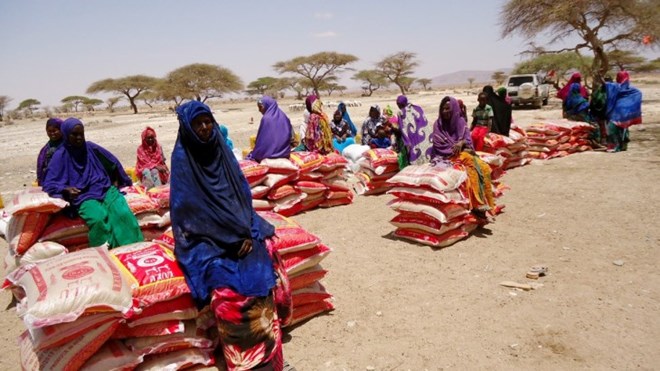
Wednesday June 21, 2017
 Somalia. Women at a distribution point in
drought-hit Sool region receive food from the ICRC. CC BY-NC-ND / ICRC /
Ahmed Abdulkadir Said
Somalia. Women at a distribution point in
drought-hit Sool region receive food from the ICRC. CC BY-NC-ND / ICRC /
Ahmed Abdulkadir Said
JUBA, June 21 (Xinhua) -- The International Federation of Red Cross
and Red Crescent Societies (IFRC) on Wednesday warned that cholera
outbreaks in East Africa and Yemen are compounding famine risks.
IFRC Secretary General Elhadj As Sy, warned that cholera was already
diverting resources and focus away from efforts to treat malnutrition
and widespread hunger.
"Right now, Red Cross and Red Crescent volunteers and staff are
working around the clock to stop the spread of cholera, and to treat
people who are sick," said Sy in a statement.
"But without treatment for malnutrition, more people will fall ill.
And a child who survives cholera will be even further malnourished. It
is the most vicious of vicious spirals, and the situation is rapidly
escalating downwards and out of control," he added.
The UN early this year warned of imminent famine in South Sudan, northeast Nigeria, Somalia and Yemen.
Yemen, Somalia and South Sudan are now grappling with escalating
cholera outbreaks that have infected more than 220,000 people and killed
nearly 2,100 since the beginning of 2017.
"Hunger kills in and of itself, but it kills to the nth degree when
compounded by disease -- and often completely preventable disease, like
measles, malaria, and cholera," said Sy.
According to the charity, there have been more than 51,000 cholera cases in Somalia and nearly 5,000 in South Sudan.
According to the UN, at least 248 people have died from cholera
outbreak across 19 counties in South Sudan since the initial outbreak
was reported in June 2016.
The UN Office for Coordination of Humanitarian Affairs (OCHA) said as
of May 15, 8,160 cholera cases had been reported since the initial case
was recorded on June 18, 2016.
In Somalia, the UN says some 683 deaths have been recorded, with a
case fatality rate (CFR) of 1.8 percent since the beginning of the year.
Sy urged states to increase their funding for humanitarian appeals in each of these countries.
He repeated his appeal for more investment in long-term solutions to
tackle the structural issues that left communities vulnerable to
malnutrition and disease. This includes, he said, investing in strong
local capacity.
"It is likely that between a quarter and a half of the excess
mortality during food crises is due to these diseases. And well over
three-quarters of victims are under five years old."
In Yemen alone, more than 166,000 cases have been reported since the
end of April -- a figure that is climbing by an average of 6,000 cases
every day.
"Although distinct, these outbreaks are all driven by a mix of
similar factors, including severe food security that is itself the
consequence of drought and conflict, and has triggered massive
population movements," said the charity.